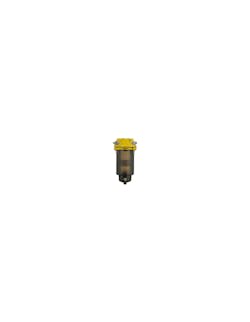Fuel filter, water separator assembly from Racor
The Racor Div. of Parker Hannifin Corp. has released a new FBO fuel filter/water separator assembly.
The FBO is designed to meet the toughest hydrocarbon refueling conditions for high-flow applications while providing easy filter changeouts, the company said. Options include a water separator, a silicone treated filter, or a water absorber.
The unit is used for fuel dispensing pumps or as a primary fuel filter / water separator on large diesel engines, or for bulk fuel handling, fuel transfer, and other higher flow applications. The FBO unit can also be used on mobile refuelers or installed in refueling cabinets.
The unit supports 10-75 gpm flow rates depending on model being used and has a locking ring collar that rotates the bowl assembly for easy maintenance. It also offers tool-less filter changeouts, die cast aluminum head and steel filter bowl, a manual drain and vent valve, sight glass, Viton seals for compatibility to various fuel types and a wide selection of accessories, filters and applications available
The FBO comes in two sizes.
